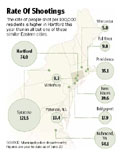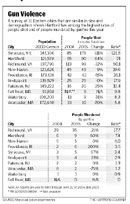 |
 |
|||
|
||||
| Web Sites and Documents >> Hartford Courant News Articles > | |||
City In A Danger Zone
"You got all these kids running
around with guns. It's not safe to step out onto the street,
even in the daytime," said Smith, 43, who has lived in the
North End her whole life. "It's as bad as I've ever seen
it up here." |
|||
Hartford police link the spike in gun crime to a dangerous new culture among young people that stresses the need to be armed for protection and a willingness by youths to settle even trivial disputes with guns. Though some of the disputes have involved traditional beefs over drug territory, many have erupted over arguments about stolen bicycles, jilted girlfriends or neighborhood rivalries. "It's the kind of stuff that you used to see kids getting into fistfights about, only now they're using guns," said Hartford Assistant Police Chief Mark R. Pawlina. "There's a total breakdown in civility or respect for life among some of these kids." Through June 20, 90 people had been shot in Hartford in 2005, which is a rate of 74 shot for every 100,000 residents. By comparison, Providence's rate - 35 people shot per 100,000 residents - is less than half of Hartford's. The rate in Bridgeport and Worcester, both of which have larger populations than Hartford, is a fraction of Hartford's rate. Hartford officials emphatically point out that serious crime is down overall in the city this year. There have been sharp declines in rapes, robberies, larcenies and burglaries. Hartford Police Chief Patrick J. Harnett has responded to the city's gun violence by increasing patrols and undercover investigations in targeted North End neighborhoods. He declined to comment on The Courant's survey. "I have too much going on to take care of in Hartford. I can't worry about what's going on elsewhere," said Harnett, who completed his first year on the job in June. "There are all kinds of things that can explain what's happening here as opposed to what's happening [in other cities]. "I don't really care to get into that kind of discussion." At the request of Gov. M. Jodi Rell, state troopers will begin patrolling in the city this week to help try to curb the gun violence. The troopers, who will patrol alongside Hartford officers, are expected to stay for several weeks. Many of the victims of gun violence this year have been teenagers. One of the latest shooting victims is a 16-year-old Kensington Street boy, who was shot in the chest Tuesday and was hospitalized in critical condition. A passing motorist spotted Tykawan Blunt, slumped and bleeding, at the corner of Garden and Nelson streets, police said. Blunt refused to answer detectives' questions about the shooting - another symptom of the pervasive street culture in Hartford, Pawlina said. "They feel like it's a sign of weakness to cooperate with the police, so they don't tell us anything even though they know who shot them," Pawlina said. "It's something that makes it very difficult for our detectives to develop information." David Kennedy, director of the Center for Crime Control at John Jay College of Criminal Justice in New York, said much of the gun violence in many cities starts with petty disputes that often escalate irrationally. "Almost none of it is about business," he said. "Almost all of it is about respect, boys and girls, social friction and social vendettas as they get played out on the street." While it is not unusual for one category of crime to spike while others drop - as has occurred this year in Hartford - increases in gun crimes often can be traced to a "quite small, super-heated group" of people committing various types of crimes, Kennedy said. The violence often stems from clashes over issues such as "respect and disrespect, and back-and-forth violence that tends to feed on itself," Kennedy said. Kennedy was one of the architects of the Boston Gun Project program, which intended to reduce gang-related and juvenile shootings in that city. The main program, "Operation Ceasefire," was credited with a two-thirds reduction in homicides in 1996 among people aged 24 and younger. It carried the message that there would be swift and severe consequences for violence and that police would swarm over an entire group for all sorts of offenses, not just those people involved in the particular incident, Kennedy said. At that point, he said, the trouble-prone people often start policing themselves rather than taking the chance that one person's actions could draw police attention to everyone else. He said other cities can adopt that approach, teaming it with extra help from social-service providers and a widespread declaration that the entire community - not just its police department - is fed up with the violence. Hartford residents like Bridgette Smith have demanded more police on their streets. "These kids are out of control," she said. "You could be standing here and some kid will drive up and start firing. It's crazy." In addition to adding patrols in the North End and teaming up with state troopers, Hartford police are also working with more agents from the federal Bureau of Alcohol, Tobacco, Firearms and Explosives to find and confiscate illegal guns. In the last two months, a new gun task force seized 48 guns, police said. Police in other Northeastern cities say they have reduced gun violence with measures ranging from redeploying current officers to sending undercover police into neighborhoods to root out gun dealers and buyers. In Worcester, for example, the police department started a "split force" program to divide uniformed officers between those who answer 911 calls and those who work in problem-plagued neighborhoods, said Worcester police Sgt. Gary Quitadamo. "Those officers are free from answering calls, so they can tackle specific problems before they get out of control," Quitadamo said. At this time last year, Worcester had 33 reported shooting victims, including eight who died. Up to June 20 of this year, those numbers had dropped sharply: Ten people had been shot, and two of them had died. Hartford is among many cities that have teamed up with federal agencies to combat gun crime through the federal Project Safe Neighborhoods program. Agents from the FBI, the Drug Enforcement Administration and the ATF help local police seize guns and arrest people who possess, use and sell them illegally. Hartford joined the program in 2002, at the same time that New Haven and Bridgeport signed on. Waterbury and Stamford joined a year later. Since then, officials in the other cities have said the program helps keep gun violence under control. In Hartford, however, previous Police Chief Bruce P. Marquis did not embrace the program or make it a top priority, said U.S. Attorney Kevin J. O'Connor, who coordinates the program in Connecticut. "Frankly, the reason that Project Safe Neighborhoods did not get off the ground in Hartford initially is that the [previous] leadership of the police department did not believe in the program," O'Connor said. Hartford took many of the same actions as other cities - assigning
officers to work with federal agents, requiring parolees to meet
with police and prosecutors and pushing for federal prosecution
of convicted felons caught with guns - but not with the vigor
of the other cities, O'Connor said. "They were doing everything in Hartford that other communities were doing, but they just weren't doing it as well," O'Connor said. Marquis, who left on Jan. 1, 2004, to take over the police department in Norfolk, Va., often battled with Mayor Eddie A. Perez about staffing levels. O'Connor said Marquis may have had legitimate reasons at the time for his lukewarm reception to Project Safe Neighborhoods. Hartford is now trying to catch up, O'Connor said. Harnett "has truly embraced the program." "We don't put hard limits or deadlines on these things, but I think you should see changes within the first year or so," O'Connor said. Speaking through Norfolk Police Department spokesman Chris Amos, Marquis on Friday said he wishes Perez and the city success in the program, but would rather not comment, deferring to Harnett. Hartford officials recently met with Waterbury police leaders for advice on reviving the Project Safe Neighborhoods initiative. Waterbury officials focused much of their energy on locating the guns and getting them off the streets before they could be used in acts of violence. Waterbury has confiscated more than 100 guns in a series of sweeps since joining Project Safe Neighborhoods in 2003, Sgt. Chris Corbett said. In Bridgeport, the Project Safe Neighborhoods program includes weekly meetings of local, state and federal law enforcement officials to review every incident involving gun violence, illegal sales and gun possession by a convicted felon. "Over the course of the last three or four years, the word
has gotten out there that if you get caught with a gun, you can
get charged federally, and they know that's a more severe sentence
than a state sentence," Bridgeport Det. Lt. James Viadero
said. A discussion of this story with Courant Staff Writer Stephanie Reitz is scheduled to be shown on New England Cable News each hour Tuesday between 9 a.m. and noon.
|
|||
| Last update:
September 25, 2012 | |
|||
|


